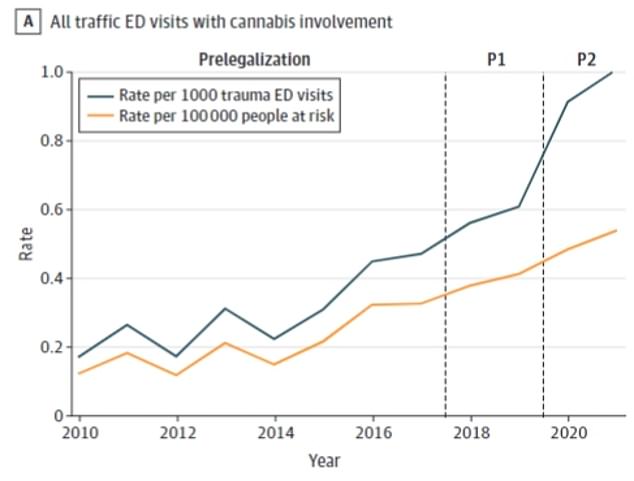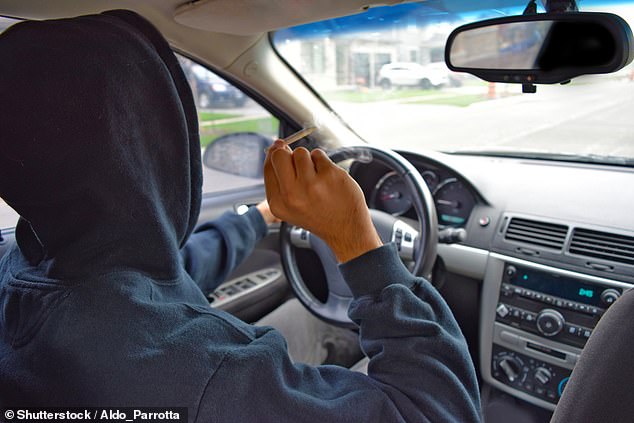
Relaxing cannabis laws appears to lead to a massive spike in serious car crashes, a study suggests.
Researchers in Canada found that hospital visits after weed-related accidents spiked 500 percent from 2010 to 2021, when the drug was gradually legalized and restrictions on sales lifted.
The upticks were especially staggering in the years immediately following the Canadian government’s move in 2018 to completely legalize the drug.
At the same time, hospital visits after crashes involving alcohol have remained steady over the years, which the researchers said suggested that cannabis use has overtaken alcohol when it comes to the leading causes of bad car crashes.

The above graph shows how rates of emergency department visits following weed-related crashes increased after three different phases of weed legalization in Canada. P1 represents the years immediately following federal decriminalization with some restrictions and P2 represents the era in which marijuana businesses and the drug’s availablility exploded




While the study was limited to Canadian drivers, weed use on the road is a wider problem affecting the US and other countries that have loosened restrictions on its use
Cannabis has not been federally decriminalized in the US as it has in Canada, though nearly half of all states have legalized it.
Recent figures in American show that legal weed has also led to an explosion in fatal car accidents.
For the latest study, researchers from the Ottawa Hospital and the Bruyère Research Institute in Ontario set out to determine how different phases of marijuana legalization affected the number of car crash injuries requiring a doctor’s attention.
They zeroed in on emergency department admissions after crashes in three distinct periods: pre-legalization from January 2010 to September 2018, legalization with some restrictions from October 2018 to February 2020, and the explosion of new vendors and companies that followed from March 2020 to December 2021.
Over the total 13-year span, emergency department visits for weed-related crashes increased slightly more than 475 percent,
The first phase of legalization in Canada imposed some restrictions on the possession and sale of the drug, such as a 30-gram limit on the legal amount a person could possess and share with others.
During that two-year period, ED visits for weed-related crashes climbed 94 percent.
In the phase that saw wider commercialization of products in more stores and online retailers, researchers saw a 223 percent increase in ED visits.
The car crashes involving weed were often severe, with nearly 90 percent of the victims arriving at the hospital via ambulance.
Almost 50 percent of weed users in a car crash required admission to the hospital for further care, compared to just six percent of drivers who did not use the drug.
Dr Daniel Myran, a family physician at the Ottawa Hospital and lead author of the study, said: ‘The observed increase in cannabis-involved traffic injuries might reflect broader trends in cannabis-impaired driving.’
Meanwhile, similar visits for crashes where alcohol was involved only increased by about nine percent.
And in fact, the number of alcohol-involved crash injuries per capita decreased by nearly 20 percent in that 13-year span.
The authors said: ‘The lack of increase in alcohol-involved traffic injury ED visits over the time period suggests that legalization may have played an important role in the observed increases.’
Younger men were more likely to get into car crashes involving weed that required a trip to the hospital.
In Ontario, people aged 16 to 21 are prohibited from driving if they have detectable levels of THC, the psychoactive chemical in marijuana, in their system.
Still, more than 26 percent of weed-related car crash injuries were in young people 16 to 21, suggesting that young drivers need to be better educated about the considerable risks attached to driving while high.
The researchers said: ‘Prevention of cannabis-involved traffic injuries is a public health priority, and large increases in visits over time, regardless of the potential contribution of cannabis legalization, suggest that interventions aimed at reducing cannabis-impaired driving may be urgently indicated.’
The study was limited in that emergency department staff may not have consistently recorded a patient’s marijuana use leading up to the crash. Over time, researchers believe that hospital staff became better equipped to test for the presence of weed in a crash victim’s system, especially after it became legal, which could explain the staggering increases they recorded.
The researchers also acknowledge that their study is just a small snapshot of the broader issue of driving while high, which US health officials are seeing as well.
A 2021 study conducted by researchers at McGill University in Canada found fatal accidents in US states that have legalized recreational marijuana increased 15 percent after legalization passed. If cannabis were legalized nationwide, that could amount to an additional 4,843 fatalities per year.
The rose-colored view of marijuana legalization, painting it as a largely innocuous drug with little addiction potential, has fed into a false sense of security about driving with THC in the body.
In Washington, which decriminalized recreational weed in 2012, cannabis was found in 17 percent of drivers behind the wheel in a crash in the state in 2014, up from 8 percent in 2013.
The team’s findings, published in JAMA Network Open are the latest in a flurry of studies in just the past couple of years pointing to possible health harms of regular or daily marijuana use, including a doubling in the risk of suffering major depression and increased likelihood of suffering a dangerous blood clot.
Source: | This article originally belongs to Dailymail.co.uk